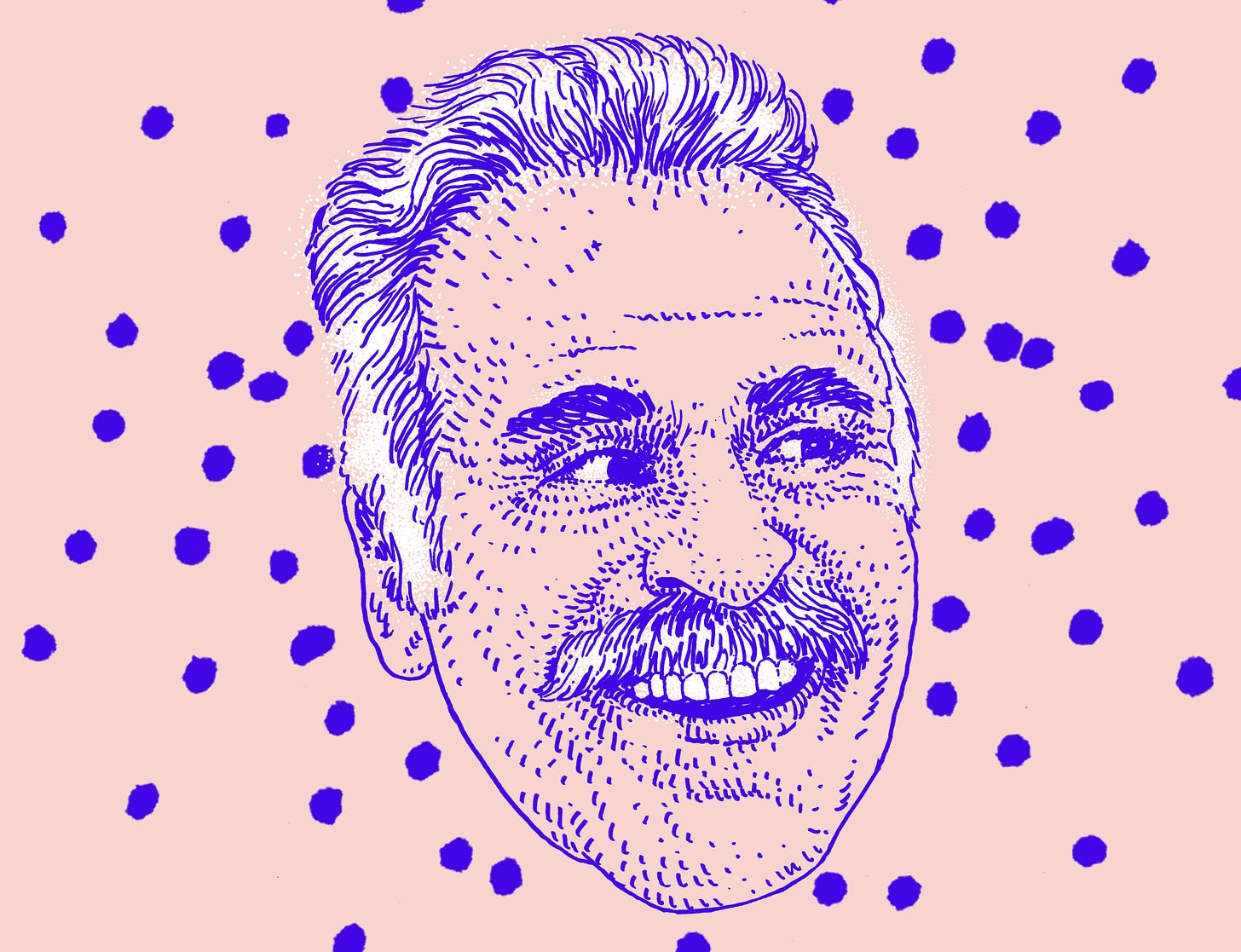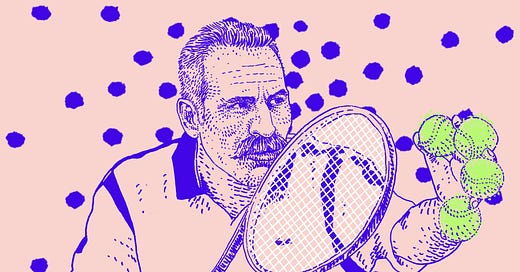Welcome to Sports Stories, a weekly newsletter of weirdo sports history illustrated by Adam Villacin and written by Eric Nusbaum. We hope you’re staying safe, and that you enjoy this week’s joyful volume.
It must say something about my tennis fandom (which is casual) that I was not familiar with Mansour Bahrami until recently. But I think it also says something about tennis that this man is not more famous. After all, Bahrami is a one man Harlem Globetrotters with a life story so poetic it can’t possibly be real.
He was born in Tehran in the 1950s, and his father was a gardener who worked in a fancy sports complex. That’s where they lived: in a tiny apartment surrounded by the city’s richest and most glamorous pursuers of leisurely athletic lifestyles. He worked as a ballboy. And of course he fell in love with tennis. Of course he was incredibly talented at it, playing with pots and pans and pieces of plywood and discarded rackets from the wealthy kids.

When he was 13, the country needed youth players to develop, and Bahrami tried out for the national program. Despite having no formal training, he was accepted. A few years later, he was on the Davis Cup team. By the time he turned 20, Bahrami was a professional. Things were looking up: it was already a miraculous story. Then came the Iranian Revolution, and all of a sudden tennis -- this western sport, this symbol of colonization -- was banned. Bahrami switched to making a living playing Backgammon. Then he went off to France, where he immediately blew all his savings: about $2,000, in a casino.
“I figured I could live on that maybe 10 days or so. Then I thought, if I win at the casinos I can get maybe $8,000 or $9,000 and stay three, four months. In 20 minutes, I lost all my money."
Bahrami was essentially homeless. He wandered the streets, slept under bridges, gave part-time tennis lessons, and refused to apply for the refugee status that would have given him permanent legal residency in France. Doing so would have meant isolating himself from his family -- possibly forever.
Instead, he fluked into the play-in bracket for the 1981 French Open. Then he proceeded to win match after match after match until, six matches later, he found himself qualified for the main draw. And in the first round at Roland Garros, Bahrami steamrolled an established French star named Jean-Louis Haillet. Bahrami lost the following match, but his performance was enough to solidify his career in pro tennis, and his legal status in France.
This was the biggest victory of his career because it allowed him to have one: For Bahrami, it was never about being the greatest, but about the ability to play and perform in the sport he loved. It was about drawing others into the sport so that they could love it as he loved it. Bahrami never won a men’s singles tournament on the pro tour. But he became a beloved star because of the way he played: exuberantly, outrageously, and often hilariously.
He generally couldn’t bear the thought of winning in straight sets and depriving fans of high stakes tennis, so Bahrami frequently let lesser opponents come back and make things close -- only to play it too close and find himself losing the match. There was never anything boring about his tennis. There was never anything boring about Bahrami the man, with his big bushy mustache and expressive eyes. He bounced all over the court with a smile on his face.

It’s hard to know what would have happened had Bahrami not lost some of his career to the revolution, and to the years he spent wandering France. Maybe if he had started from a younger age, and developed his talents alongside the kids he was working for as a ballboy, he would have become a superstar like his friends Yannick Noah, John McEnroe, and Bjorn Borg. But instead he became a different kind of star.
Bahrami was a journeyman who became beloved for the exuberance he showed on the court. He put on a show. Insane trick shots. Hilarious rallies. Playing the net from one knee. The talent was so obvious, but also the fact that for some people winning isn’t everything and it doesn’t need to be. For Mansour Bahrami, playing tennis itself is a beautiful thing. He still plays in legends tournaments with his buddies from the old days. It’s a bunch of multiple Grand Slam winners and Mansour Bahrami because Mansour Bahrami has a greater gift than any of them: he can bring joy to the people who watch him.. What else are sports for?
When things get back to normal, or whatever normal becomes, I hope we can all find some of that gift within ourselves. And that we can take a moment to appreciate those of us who already have it.
Related Reading
Mansour Bahrami’s autobiography is called The Court Jester. Honestly, that’s all that needs to be said here.
Stealing Home
The book has been out for a little over a week. I wanted to say thanks to all of you who have read it, shared it, or even thought about it. Our hometown paper, the LA Times, has been really good to the book.
There was an excerpt, which you can find here.
And a cool story about the book, which you can find here.
If you’re still on the fence, please consider picking up STEALING HOME from your local bookstore. And if you liked the book, please feel free to review it on Amazon or Goodreads, or share it (in addition this newsletter) on your favorite social media website or app.
Sports Stories Jr.
If you have kids, or know kids who want to write+draw their own Sports Stories, it’s not too late to send them our way! We’d love to publish them in a future issue! Just respond to this email with your (kid’s) submission.
This has been Sports Stories by Eric Nusbaum (words) and Adam Villacin (art). If you have any questions, comments, or concerns, please reply to this email or contact enusbaum@gmail.com. We’d love to hear from you.
Sports Stories is 100 percent free. If you enjoyed this week’s newsletter, and want to show your appreciation, the best way to do that would be to sign up, share it on social media, or forward it to someone you think might enjoy it too


